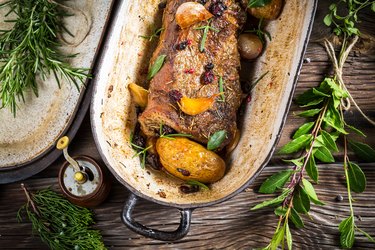
If you've already ditched beef for bison, you may be interested in adding venison to your list. Low in calories and fat and high in protein, venison meat comes from deer and is a lean source of protein to consider trying.
Video of the Day
Video of the Day
Venison Nutrition
Despite that it's considered a form of red meat, venison is low in fat and calories. A three-ounce serving of ground venison has just 159 calories, whereas a same-size serving of beef contains 215 calories total.
Venison is also significantly lower in fat and higher in protein — a double win! While three ounces of beef packs about 17 grams of fat and 14.5 grams of protein, venison boasts only 7 grams of fat with 22.5 grams of protein. However, the lower fat content renders venison is a little tougher in texture and a little less rich in flavor.
Deer meat also beats its bovine counterpart in the iron department. Iron is a mineral that helps your body promote healthy red blood cells, according to Harvard Health, and being deficient can cause fatigue or grogginess throughout the day.
How to Prepare Venison
Venison can be refrigerated or frozen as cuts of meat or in the form of sausage, according to the National Center for Home Food Preservation. However, if you're harvesting the meat yourself, you want to use extreme care not to contaminate the meat while field dressing and you'll want to cool the meat as soon as possible. Store venison in the fridge for no more than three days, keeping the meat sealed and separated from other foods.
Trimming the fat from venison will significantly improve the flavor of the meat, preventing that gamey flavor that usually accompanies this protein, according to the National Center for Home Food Preservation. Aging the meat will also help dissipate the gamey flavor and cause the meat to grow more tender.
Read more: 4 Health Benefits of Eating Red Meat
How to Cook Venison
There are a few factors to keep in mind while cooking venison. Unlike other meat sources, color and texture are not safe ways of determining whether or not your venison is sufficiently cooked, according to Michigan State University. When cooking venison, it's advised that you use a food thermometer to verify the meat reaches an internal temperature of 160° Fahrenheit.
When it comes to cooking your venison, game meats typically taste best when prepared on low, moist heat for extended periods of time, recommends Michigan State University. You can also marinate your venison before cooking to add tenderness to this typically tough meat.
- USDA: "Game Meat, Deer, Ground, Cooked, Pan-broiled"
- USDA: "Beef, Ground, 80% Lean Meat / 20% Fat, Raw"
- Harvard Health: "Iron and Your Health"
- National Center for Home Food Preservation: "Resources for Home Preserving Venison"
- Michigan State University: "Handling, Using and Storing Venison"
- USDA National Nutrient Database: Beef, Loin, Tenderloin Steak, Boneless, Separable Lean and Fat, Trimmed to 0" Fat, All Grades, Cooked, Grilled